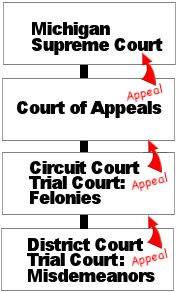 Since William Maze is a trial lawyer, only a small portion of our practice is dedicated to criminal appeals. We do pursue appeals, however, and our briefs have persuaded Michigan judges to change case law in favor of the accused. Appeals are far different from arguing cases before a jury. At best, after providing long, tedious briefs, the limited oral argument that occurs in court is made before a single judge or a small group of judges. Appeals are decided primarily on the briefs, and the value of oral presentations is limited.
Since William Maze is a trial lawyer, only a small portion of our practice is dedicated to criminal appeals. We do pursue appeals, however, and our briefs have persuaded Michigan judges to change case law in favor of the accused. Appeals are far different from arguing cases before a jury. At best, after providing long, tedious briefs, the limited oral argument that occurs in court is made before a single judge or a small group of judges. Appeals are decided primarily on the briefs, and the value of oral presentations is limited.
There are two types of appeals in Michigan. The first is an appeal of right. A person is entitled to an appeal of right when a person has gone to trial and lost, or a motion has resulted in the case being dismissed. An appeal of right from district court to circuit court requires a filing fee, several administrative documents, a transcript (which is usually very expensive), and a detailed appellate brief. The appeal is decided before a single circuit court judge, and that judge can only rule on whether the lower court's legal rulings were correct. In other words, an appeal of right is not akin to a second trial. By the time an appeal is filed, the facts of a case are written in stone and cannot be changed. Even if the circuit court judge disagrees with the lower court judge or disagrees with a verdict, mere disagreement is not enough. The purpose of an appeal of right is to determine whether the lower court applied the correct legal standards. In cases where the district court judge made unfavorable rulings or made mistakes, the higher court must apply established law to decide if those errors are harmless or violated the defendant's rights in some manner.
An appeal of right from circuit court goes to the Court of Appeals. The Court of Appeals process for an appeal of right is nearly identical, but the case is decided by a panel of three Court of Appeals judges. Appeals from the Court of Appeals go to the Michigan Supreme Court, and all of those applications are discretionary, e.g. the Michigan Supreme Court may decide not to hear the case just because they do not feel it merits attention.
The second type of appeal in Michigan is discretionary. A person or party may ask a higher to grant "leave to appeal." An application for leave to appeal might occur while a case remains pending in the lower court. For example, if a motion to suppress certain evidence is granted or denied, an application for leave to appeal can be filed with the higher court to review the lower court’s decision. This is known as an interlocutory appeal. An interlocutory appeal occurs while the case remains pending.
Another form of an application for leave to appeal can be filed when the criminally accused accepts a plea. If you are accused of a crime and elect to take a plea, you give up the right to file an appeal. However, this does not prevent you from asking a higher court to review the case. Instead, the plea converts the appeal to a discretionary matter. It is important to underscore that, even if the higher court agrees to hear the appeal, facts are construed in favor of the prosecutor after a plea has been accepted by the defendant. In other words, if you have factual issues that should be presented to a jury, an appeal is not a substitute for a jury trial.
Here at the Maze Legal Group, we emphasize preparing cases for trial. Whenever there is doubt, a person should prepare for trial. The legal system cannot be relied upon to come to a person’s rescue if a jury trial is waived or a plea is accepted. Nonetheless, criminal appeals are useful tools in many criminal cases. When it is appropriate, we pursue criminal appeals to address the legal issues that might otherwise cause a wrongful conviction.